Kevin Costner and Dwier Brown tried to change FIELD OF DREAMS’ most memorable line: 17 Crazy, Magical Facts About the Baseball Classic
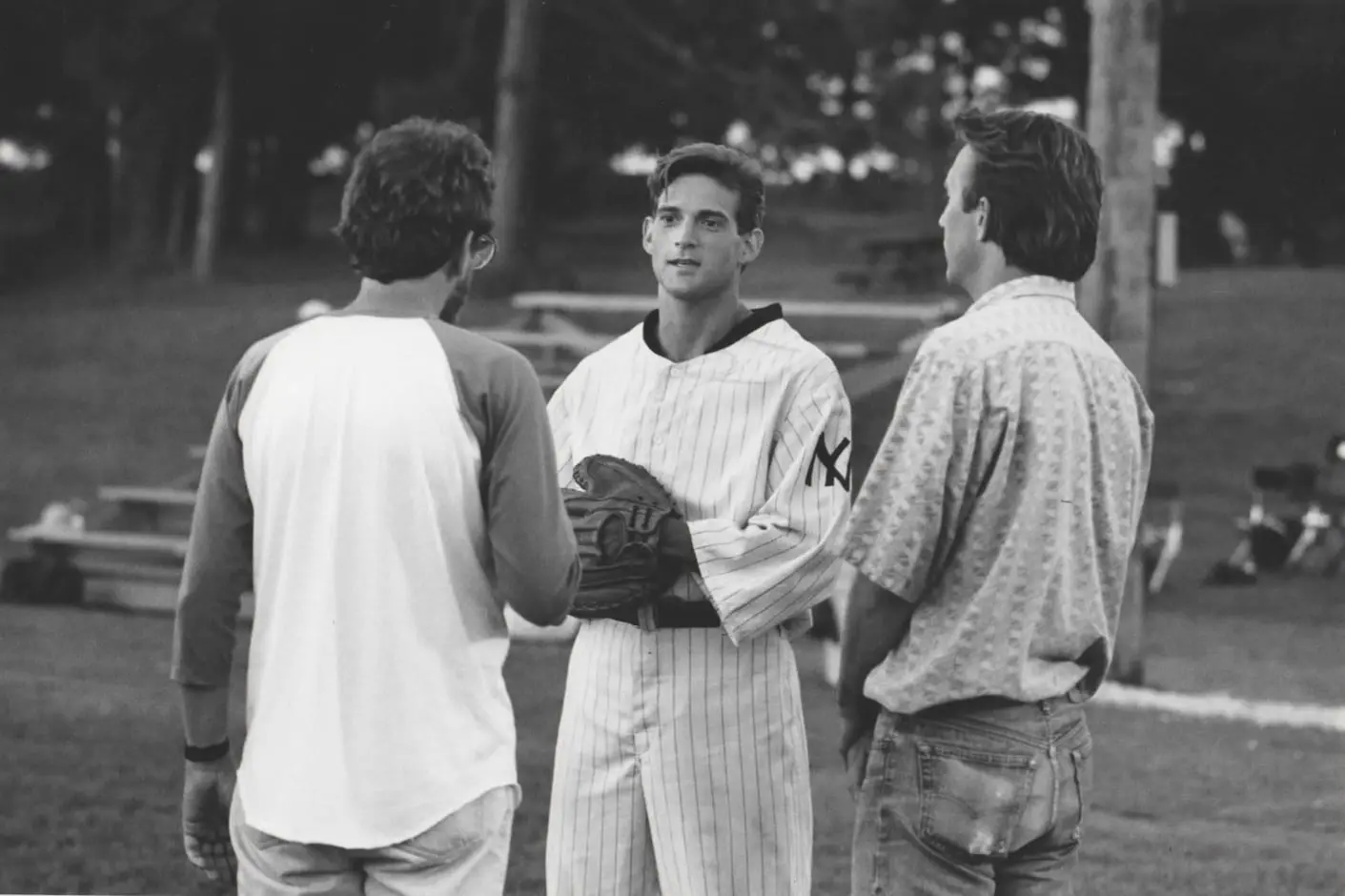
Thirty years ago, Dwier Brown had a small but significant role in Field of Dreams, playing the late, estranged father of Ray Kinsella (Kevin Costner). The movie is a fantasy for sons and baseball fans, a special piece of cinema that transcends the screen, and contains one of filmdom’s most touching, rewarding scenes. On June 16 and 18, TCM Big Screen Classics is teaming up with Fathom Events to put the 1989 sports classic back in theaters for Father’s Day. Brown spoke to us and gave us some quick hit fascinating facts, such as:
- Jim Carrey was also up for the role of John Kinsella.
- Brown opted not to pursue a friendship with Costner during filming because the familiar strangers vibe was a better fit for their characters.
- After the first screening, Kevin Costner predicted Brown would be a huge star in five years. ” That wasn’t what happened to me,” Brown said. “But I was pleased to hear that was his opinion at the time!”
And then, Brown revealed phenomenal insights about the film that might just blow your mind:
4. Something eerie happened to Dwier Brown before shooting began.
“One of the strange things about the whole experience for me was that I got cast a few months before we went to shoot it. I grew up on a farm in Ohio, so I was going to visit my folks on the way to Iowa to shoot the movie. About a week before I was heading home, my mom called to say, “Your dad is in the hospital, maybe you should come home.†I said, “I’ll be home in a week.†And she said, “Oh, that’s okay, no problem.” But I had this feeling I should go home early, and I did. My father died that night, I got a chance to talk with him. He died that night, so this is 30 days before I’m going to shoot in Iowa. The significance of the movie changed for me entirely.
“I left my father’s funeral and then went to play a father coming back from the dead to have a catch with their son.”
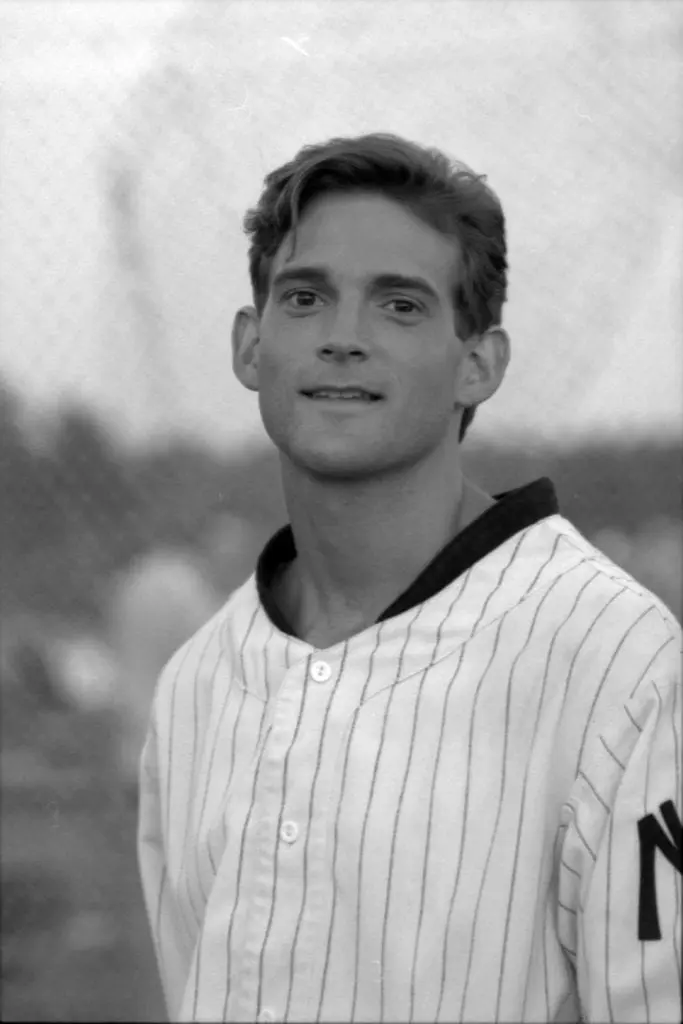
5. Dwier Brown believes his dad was present among the ghost players.
“The odd thing was that my father, who was a pretty stoic World War II-Depression era guy, when he died I couldn’t get over this feeling that he was free. I had this feeling that he was flying through space, he was soaring off to Jupiter, and then coming back and laughing in a way which had never been in my experience of him. That was confusing to me. I couldn’t feel very sad about [his death] because my dad had this pretty rough life and was suddenly unburdened with all of that, [like he could] just do whatever he wanted and was free. That confounded the situation even more because I really felt like my dad was in the cornfield and kind of flying around with the ghost players in the movie. “
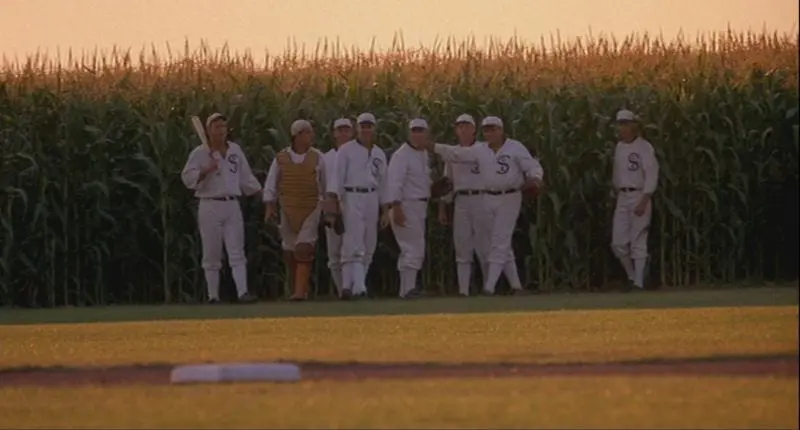
6. The film generates a magical healing connection for viewers.
If watching the film makes you have warm, fuzzy thoughts about your own dad, well, you’re not alone. Brown says he’s become a conduit for viewers to channel the memories of their father.
“After the movie came out a year later, I began these strange encounters where somebody would approach me tentatively and once they realized I was in the movie, their eyes would glaze over and they would start telling me about their dads. It became this strange, kind of regular occurrence. Either their father was great and they played catch every night with them, or they never played catch with their dad, or their dad died when they were 3 years old and they never had a chance to have a relationship. I started becoming this surrogate father or this priest about their dads and their relationships with them. “
Brown assumed Kevin Costner, James Earl Jones, and the other actors were experiencing the same thing. They were not.
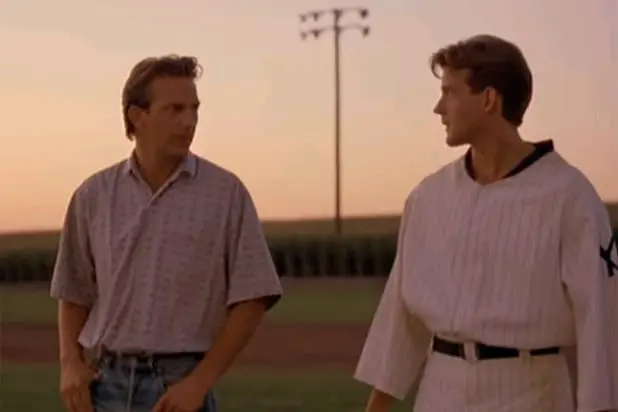
7. Perhaps the magic comes from weeks of shooting the same scene over and over during “the magic hour.”
“When we shot those scenes, the final five minutes, we ended up shooting it over two weeks time because they wanted to shoot at magic hour: just after sunset, there’s those 15 minutes of golden light in the sky. They wanted that light, so as a result, we only had 15 minutes every day to shoot as much of that scene as we could. Essentially, the camera crew would run out just before sunset and set everything up and then we’d wait and wait until the light was just right. Then, [director Phil Alden Robinson] would say “Action!†and I’d say, “Is this heaven?†“Okay, great, do it again..†“Is this heaven?†“Okay, let’s do that and come back tomorrow.†The next day, we’d set up around Kevin and he’d say, “No, it’s Iowa. …No, it’s Iowa.†It became very magical because we’d try to shoot this same scene over two weeks in snippets. Kevin and I would have to get ourselves in that same emotional state day after day. “
8. The crew felt something special and acted unusually reverent.
“I think the crew kind of got into it too, and in a funny way, they all brought their own fathers to that field. They worked very quietly and respectfully that film crews aren’t known for – usually, guys are having fun and cutting up. That scene became a little sacred while we were shooting it, and I think that’s reflected in the final product.”
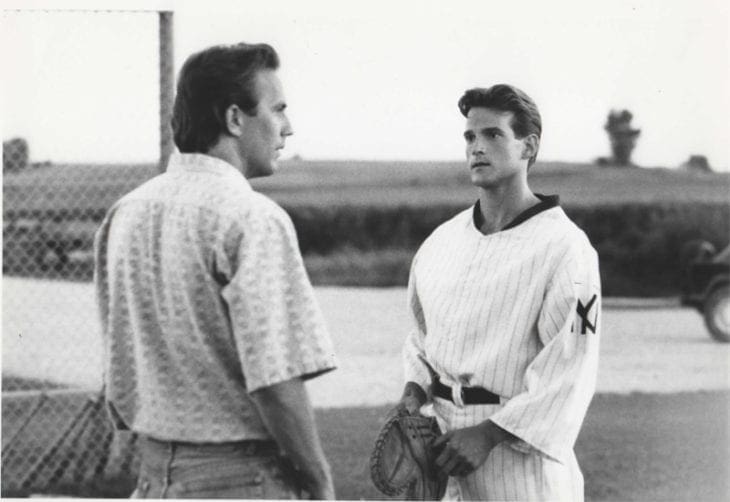
9. Those involved in the production were speechless when they saw the final product.
“I think we were all surprised. Film crews can get to be pretty cynical because we shoot a lot of movies and we know what’s going on behind the curtain. The cast and crew screening was the first time many of us realized what an interesting phenomenon we’d created. Cast and crew screenings are ribald events, where everyone’s teasing each other, pointing out little things the audience member wouldn’t see like, “oh you painted the bar the wrong color. ” It started out that way, but a half hour, 45 minutes in, it started getting quieter in the room, there were probably 300 or 500 of us in the room. And, by the end of the movie, we were all crying, I mean, we’re the people who shot the movie and it’s my face up there, and, we’re still deeply, emotionally affected by this. So, the lights come up and it’s the quietest cast and crew screening room I’ve ever seen. We all looking at each other like, oh my gosh, what happened?”
10. There’s an academic theory that John Kinsella is a redemptive avatar for Holden Caulfield.
“Somebody wrote their academic thesis titled “Catcher in the Rye versus Catcher in the Corn.†Very interesting theory was that in the book “Catcher in the Rye,†Holden Caulfield has this dream that he’s in this field and children are playing and there’s this big cliff. The symbolism being that you lose your childhood innocence, that falling off that cliff was losing your innocence. It was Holden’s dream to let people keep their innocence. In Catcher in the Rye, he fails to do that. The similarity being that I play a catcher, I’m in the corn, and I sort of do succeed in letting everyone gets to keep their innocence. Doc Graham gets to play baseball again, Ray gets to see his dad, Terence Mann writes again and goes into the corn, Archie plays ball again, anyway – it’s an interesting theory. As cynical a guy as Bill Kinsella is, his early story, Shoeless Joe, is really an upbeat ending.”
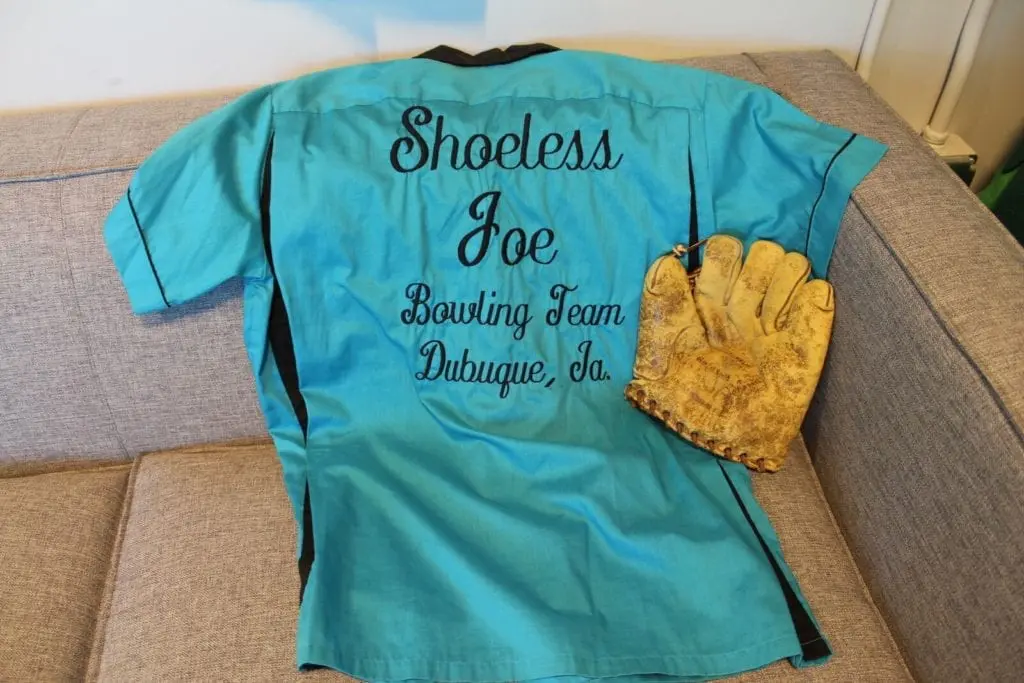
11. During downtime, the cast and crew became a Field of Drunken Dudes.
“Most of the guys were from LA or Chicago or New York, and they were just bored silly. Dyersville isn’t much of a town now but it was less then. There was not a hotel or anything. The farm itself was literally on dirt roads. You had to drive for 10 miles on dirt roads. By the time I got there, which was late in the shoot, the art department made a dozen different Shoeless Joe t-shirts, just because they were bored and they’d toss them off to everybody, and we all wore these baseball shirts with little corn icons on them. They started a bowling league at the local bowling alley. I have a bowling shirt still that has embroidered on the back: Shoeless Joe bowling team, we all came up with fake bowling names, my name was Lou – and that’s on the front. We’d go bowling. And, when they would close, we’d go to the dog tracks…we’d go en masse and bet on the dogs. We had all this per diem burning a hole in our pockets. We’d go to the bars, they’d close at 2 o’clock in Iowa. But if you cross to East Dubuque, then you’re in Illinois; because of the exploits of Al Capone and prohibition, those bars stay open til 4! Then, we’d go to this little town – which is not a town at all, It is just a strip of bars, 2 blocks long. It’s just all of the raunchiest basic pour alcohol down your throats bars, and we’d go there until 4, then stagger home and be ready for the next day.”
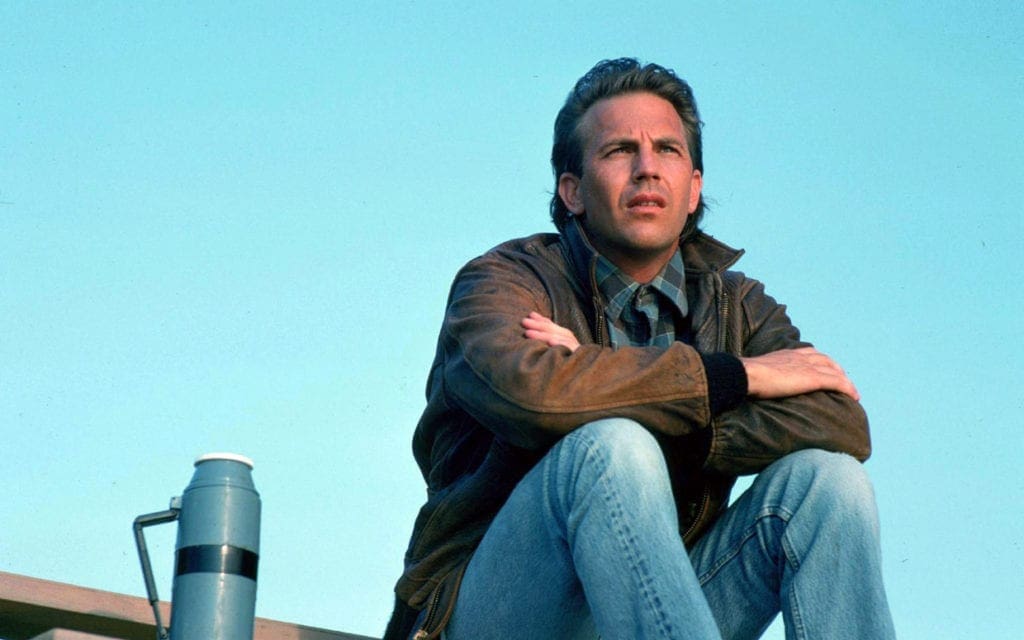
12. Everyone knew they were experiencing the crossroads of Kevin Costner’s career.
“Bull Durham came out while we were shooting Field of Dreams. So, we were in Iowa and we’d go out with him and it would be all mellow. But, as soon as that movie came out, within a week, we could hardly go anywhere with him. We’d have to leave bars because women would just flock around him, and we’d exodus and head somewhere else until people caught on there. It changed.
“The thing that makes it particularly odd with Kevin, was that during the breaks of shooting Field of Dreams, Kevin went to his trailer with Michael Blake and they were writing Dances with Wolves. So, it was a real crossroads in his career: there’s the movie that made him a sex symbol movie star, to the one we were all in together, to the one he won an Oscar for a year later. “
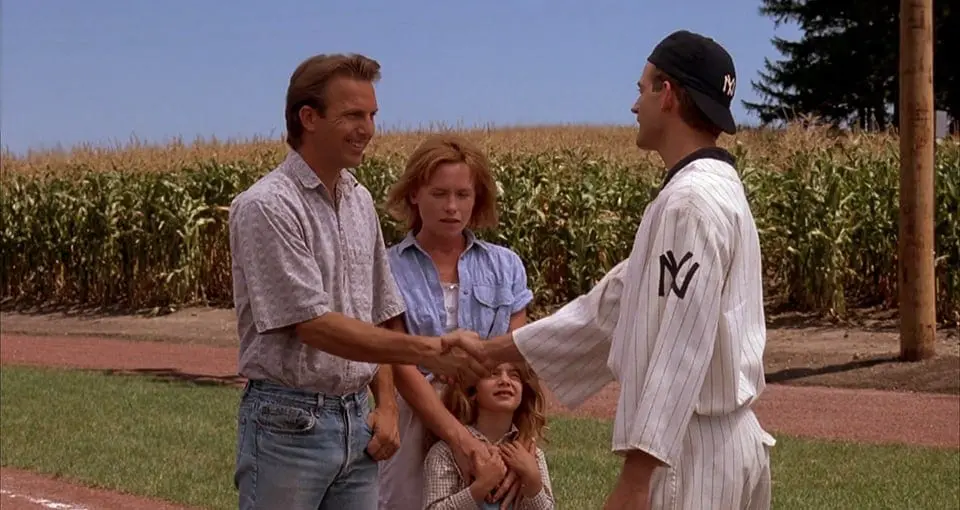
13. The actors didn’t say that magical last line as we hear it.
The audience hears, “Dad, wanna have a catch?” But “dad” wasn’t in the script – so the actors didn’t say it: the audio was recorded and added later. However, John Kinsella reacts as if that is what Ray says.
“I felt like from reading the script and the book, that’s there some sort of magical aura about the field, that nobody quite understanding what’s going on. Early on, when Amy Madigan invites Shoeless Joe into the house for coffee, he says, oh, I don’t think I can, and he looks down at the baseline. When Archie Graham steps over the baseline and immediately his feet turn into Doc Graham’s feet. There’s a mystical something going on that nobody understands. The way I played it personally – and I think Kevin and I talked about this – I knew that he was my son, but I don’t know if he knew that I was his father, and we say that, will all this disappear? Will the magic will be broken and I return to purgatory or wherever I appeared from in the first place? I like playing subtle tensions like that, I think it adds to the movie’s delicate balance that happens in the end.
“I was frankly disappointed that they put the word ‘dad’ in there. When Ray introduces me to his family and he says, ‘This is my — . This is John.’ I shoot him a little look that says, “Are you going to say this?†People don’t see that or notice that, but that’s part of what an actor does, play subtext and subtleties.
“But Phil said in audience screenings that people were kind of mad at Ray for not saying he’s your dad, they thought it’s kind of cruel not to say, ‘Hey, I’m your son.’ I can see that, I certainly wouldn’t want people to leave angry. In retrospect, I was hoping my brilliant performance would let those understand (laughs). It’s a small concession to make.”
14. Kevin Costner and Dwier Brown tried to rewrite the last line.
“Among the things Kevin and I talked about when we were getting ready for that scene where we stood around for hours waiting to shoot, both of us said, “Hey what do you think about this ‘wanna have a catch’ thing?” Kevin grew up mostly in California, and he was like, “Yeah, that’s so weird. We used to say ‘wanna play catch.’†And I said, “Yeah, yeah, me too!†And, I was from Ohio. We didn’t think Phil was particularly athletic, so we thought maybe he was one of these guys who doesn’t really know, because “wanna have a catch†is such a dorky way to say that line.
“We went to Phil together and said, “Hey Phil, there’s this one line that we both feel awkward saying and were wondering if we could change it to “you wanna play catch?†Phil said, “Oh, no, no, no. I grew up in Long Island, and that’s what we say, ‘wanna have a catch.’†Sure enough, it’s been verified by many people, East Coasters say, “wanna have a catch.†As odd as it was to say that, in retrospect, I really am grateful we worded it that way for several reasons. One is that “have a catch†is more poetic than “play catch.†Catch in this movie is not a frivolous play or game, it really is the basis of how they heal their relationship. So, “having a catch†makes it sound more significant which is really right for the movie. The other thing is, when someone says “wanna have a catch,†you immediately think of the movie. Even if those New Englanders, it sounds like their childhood. The rest of us hear it in a different way. I can only think of the movie when I hear it.”
15. Dwier Brown felt he was undeserving of people’s affection for the film.
“To be honest, for the first 25 years of the movie and frankly, until I wrote the book [“If You Build It…”, I was a little embarrassed for the attention I would get for Field of Dreams. I always enjoyed coming to the reunions, but I was a little bit surprised. Here, I have this 5-minute role. My feeling was that the rest of the cast spent the whole movie and all their efforts to open the audience’s heart, and then I get to take off a catcher’s mask and walk into anyone’s heart. I always felt like anybody could have done that. This is borne of my own lack of confidence, but I was a little embarrassed when people would make a big fuss, and I thought, c’mon, anybody could’ve done that. It was only after I wrote the book and realized how many factors moved me to be in that part and how many parts I didn’t get. I was up against Tom Cruise for the lead in Risky Business and I was up against Brad Pitt for that great role in Thelma and Louise. I didn’t get those movies, this is what I got. Its five minutes. It didn’t make me a super star, but if I’m going to beat myself up for missing out on those other roles that I was close to, I might as well as accept that the fact that this is the part I got. And, I did a good job in that movie. I realized I brought that part as best I could and I brought something to this role that a lot of people wouldn’t have. Maybe Tom Cruise, maybe Brad Pitt, maybe I brought something that isn’t in their acting repertoire. I forced myself after I wrote the book to own that’s the movie I’m in. People recognize me on the street for it and they tell me magical things, which I probably enjoy more than Tom Cruise or Brad Pitt or Jim Carrey, because I don’t have to deal with superstardom every single day. When people recognize me from that movie, it’s in the best possible way. They’re usually emotionally touched by it and grateful to me for my little part in it. I try to complete that transaction by saying, ‘Thank you very much, it was an honor to be in that movie.'”
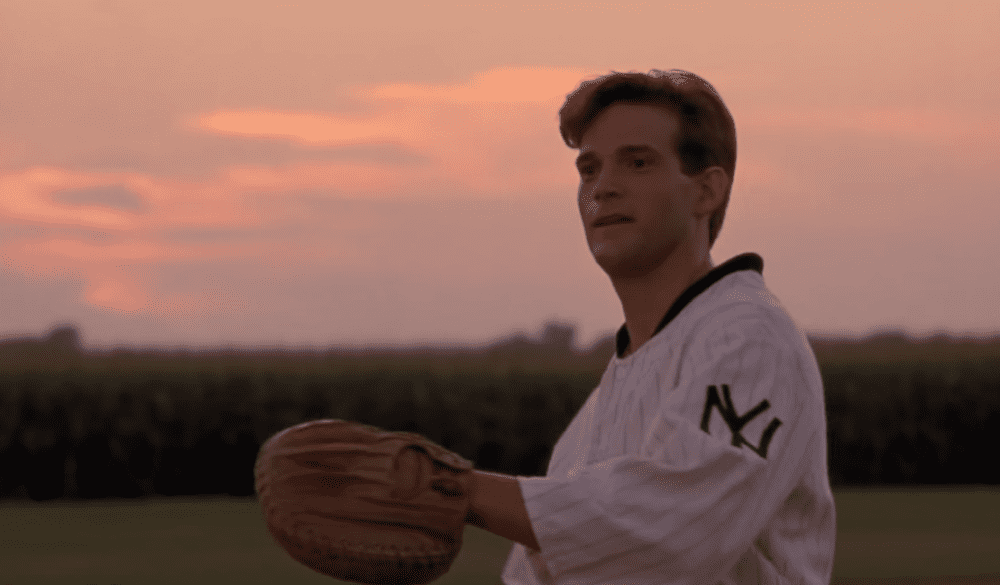
16. Dwier Brown hasn’t seen Field of Dreams with his own children.
The real children of “John Kinsella” are now a 26-year-old daughter and a 20-year-old son. He says he’s never sat down and watched the movie with them, but yes, he’s had some Field of Dreams moments with them.
“At the 25th anniversary, I took my son with me, and people were crowding me because they’re fans of the movie and here we are at Dyersville right on the field. Woody was just standing off at a distance, just watching because it was something he’d never seen – the phenomenon of his dad as a “famous” dad. He was 15 at the time, and he was taking it all in. I was having a catch with strangers on the field. We had the interview with Bob Costas and Kevin, and the whole day passed in a blur. The next morning I was starting a book tour [for “If You Build It…”]– and Winnebago had sponsored me – so I was driving to Ohio in this giant Winnebago. We were just ready to head out of town, and my 15-year-old son – and the worst part of a father-son relationship is about 15 when they want to be their own man and dad’s being bossy or trying to keep them as a child – he says to me, “Hey dad, you played catch with a lot of people last night, but I didn’t get to play catch with you.” It just broke my heart. I was like, okay, let’s go! So, we postponed our sendoff and drove the Winnebago to the field at 6 in the morning. I played catch with my son Woody on the field. It was just so special to me, and hopefully to him. We took batting practice and it was just magical. Then, at 9 a.m. a Little League team arrives and I was mobbed again. So, I did my duty and said hi to everybody and then we got in the Winnebago. But, that was as close as I got from a full-circle, father to son, son to father reenactment with my own son, and it was every bit as emotional as the movie.
17. Cinema’s Beloved Ghost Dad Doesn’t Get to Spend Father’s Day with His Kids
“I’ve been away for every Father’s Day since I wrote the book because ball clubs want me to come be their guest of honor on Father’s Day. It’s been kind of ironic that I’m the famous father who has to be away from his own family on Father’s Day. I do get my time with my kids in…I hope they don’t begrudge the general public for stealing me on Father’s Day!”
Of course, I suggested that since the TCM Big Screen Classics 30th Anniversary screening of Field of Dreams is ALSO playing the Tuesday after Father’s Day, the opportunity was there to experience the same magic with his own kids, now grown, just like Ray and John. To get more information and find out where screenings are in your area, go to the Fathom Events site HERE.
